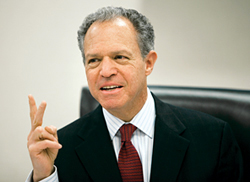Bill Brodsky, chief executive of the Chicago Board Options Exchange, in a speech at an industry gathering last week, criticized a group of options exchanges for trying to circumvent longstanding order exposure rules.

Speaking at the annual conference of the Chicago chapter of the Security Traders Association on Thursday, Brodsky complained that several of his rivals were trying to push through new rules or order types that would allow brokers to avoid exposing their orders to open competition at the exchanges.
"They would avoid full exposure to the marketplace precisely at a time when market transparency needs to be the rule and not the exception," Brodsky said. "This should be troubling to both investors and market makers."
The CBOE chief’s comments echo charges made by options exchange executives last year over some of the plans of their competitors. Specifically, executives charged the International Securities Exchange, NYSE Arca Options, and the BOX Options Exchange with introducing proposals to allow brokers to bring client orders to the exchanges and fill them without offering other exchange members a chance to trade against them.
For their parts, ISE and Arca were said to be trying to make it easier for institutional brokers to cross unfettered large orders on the exchanges. Crossing has become big business lately, accounting for as much as 30 percent of industry volume by some estimates.
Both BOX and Arca also had proposals in front of the Securities and Exchange Commission that, detractors argued, would allow market makers to trade against directed flow unfettered.
All of the proposals have either been approved, withdrawn, or, in the case of BOX, approved by the SEC.
Critics have charged the proposals are tantamount to ‘internalization’ as it is practiced in the cash equities business. Internalization, or filling orders within a brokerage’s four walls-and not on an exchange-is a legitimate practice in the cash equities business. It is largely prohibited in options.
For its part, BOX denies it sanctions internalization. "There is no internalization mechanism at BOX," Alan Grigoletto, a BOX senior vice president in charge of business development and marketing, said. "We have never had a proposal in front of the SEC requesting unfettered crossing inside of our exchange."
Whatever the case, Brodsky is pushing the SEC to keep internalization out of options. "We hope the Commission will avoid the problems that have happened on the stock side, where they have allowed transactions to take place off exchanges without transparency or reasonable regulation," he said at STAC. "We believe these tenets should remain in the options markets."



